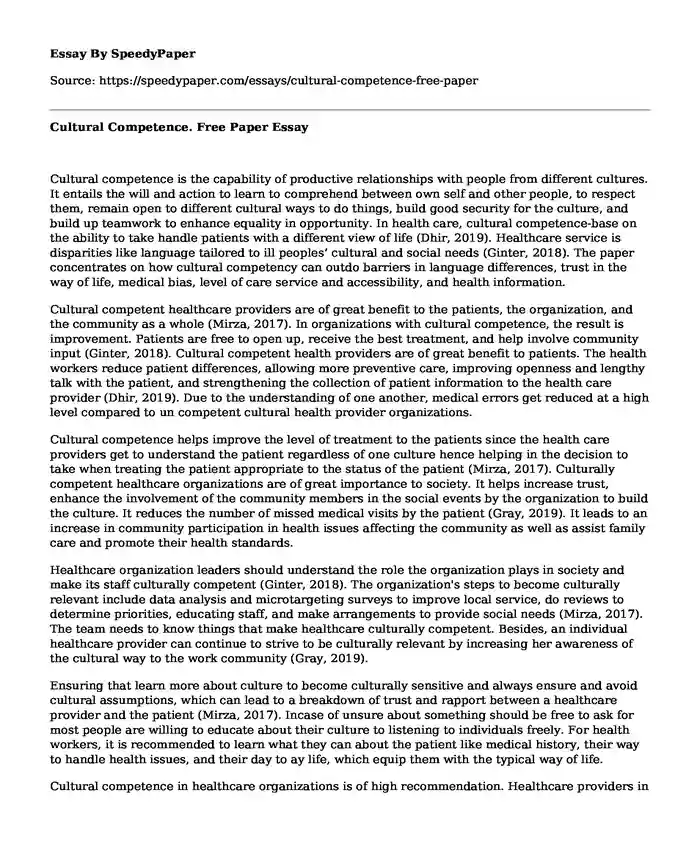
| Type of paper: | Essay |
| Categories: | Multiculturalism Diversity Healthcare policy Public health |
| Pages: | 3 |
| Wordcount: | 744 words |
Cultural competence is the capability of productive relationships with people from different cultures. It entails the will and action to learn to comprehend between own self and other people, to respect them, remain open to different cultural ways to do things, build good security for the culture, and build up teamwork to enhance equality in opportunity. In health care, cultural competence-base on the ability to take handle patients with a different view of life (Dhir, 2019). Healthcare service is disparities like language tailored to ill peoples’ cultural and social needs (Ginter, 2018). The paper concentrates on how cultural competency can outdo barriers in language differences, trust in the way of life, medical bias, level of care service and accessibility, and health information.
Cultural competent healthcare providers are of great benefit to the patients, the organization, and the community as a whole (Mirza, 2017). In organizations with cultural competence, the result is improvement. Patients are free to open up, receive the best treatment, and help involve community input (Ginter, 2018). Cultural competent health providers are of great benefit to patients. The health workers reduce patient differences, allowing more preventive care, improving openness and lengthy talk with the patient, and strengthening the collection of patient information to the health care provider (Dhir, 2019). Due to the understanding of one another, medical errors get reduced at a high level compared to un competent cultural health provider organizations.
Cultural competence helps improve the level of treatment to the patients since the health care providers get to understand the patient regardless of one culture hence helping in the decision to take when treating the patient appropriate to the status of the patient (Mirza, 2017). Culturally competent healthcare organizations are of great importance to society. It helps increase trust, enhance the involvement of the community members in the social events by the organization to build the culture. It reduces the number of missed medical visits by the patient (Gray, 2019). It leads to an increase in community participation in health issues affecting the community as well as assist family care and promote their health standards.
Healthcare organization leaders should understand the role the organization plays in society and make its staff culturally competent (Ginter, 2018). The organization's steps to become culturally relevant include data analysis and microtargeting surveys to improve local service, do reviews to determine priorities, educating staff, and make arrangements to provide social needs (Mirza, 2017). The team needs to know things that make healthcare culturally competent. Besides, an individual healthcare provider can continue to strive to be culturally relevant by increasing her awareness of the cultural way to the work community (Gray, 2019).
Ensuring that learn more about culture to become culturally sensitive and always ensure and avoid cultural assumptions, which can lead to a breakdown of trust and rapport between a healthcare provider and the patient (Mirza, 2017). Incase of unsure about something should be free to ask for most people are willing to educate about their culture to listening to individuals freely. For health workers, it is recommended to learn what they can about the patient like medical history, their way to handle health issues, and their day to ay life, which equip them with the typical way of life.
Cultural competence in healthcare organizations is of high recommendation. Healthcare providers in a healthcare center are of great value to the community. They are fully equipped with their way of life, and this helps them interact with more details with the patients in the city, thus improving the health care of the society people. Cultural competence is of great necessity in healthcare centers and organizations. However, the government should make it a policy for all healthcare organizations rule to have staff who are culturally competent.
References
Dhir, S. (2019). The changing nature of work, leadership, and organizational culture in future-ready organizations. Corporate culture, Management, Leadership, Job redesign, Organizational Behavior, Innovation, Change Management, Human Resources, VUCA.
Ginter, P. M., Duncan, W. J., & Swayne, L. E. (2018). The strategic management of health care organizations. John Wiley & Sons.
Gray, J. S., Connolly, J. P., & Brown, M. A. (2019). Measuring intercultural knowledge and competence in college essays: Does a performance-based rubric have construct validity?. Studies in Educational Evaluation, 62, 142-148.
Mirza, M., Harrison, E. A., Chang, H. C., Salo, C. D., & Birman, D. (2017). Making sense of three-way conversations: A qualitative study of cross-cultural counseling with refugee men. International Journal of Intercultural Relations, 56, 52-64.
Cite this page
Cultural Competence. Free Paper. (2023, Aug 02). Retrieved from https://speedypaper.net/essays/cultural-competence-free-paper
Request Removal
If you are the original author of this essay and no longer wish to have it published on the SpeedyPaper website, please click below to request its removal:
- Aviation Security Essay Sample from Our Database
- Essay Sample on Ergogenic Aids - Creatine Supplement
- Free Essay on the Threats of Overpopulation on Humanity and the Planet
- Free Essay Sample: High-Value Care
- The Minimum Conception of Morality - Free Essay
- Free Essay on Technology Addiction
- Effective Decision-Making in Nursing: Evidence-Based Treatment for Improved Patient Care
Popular categories




